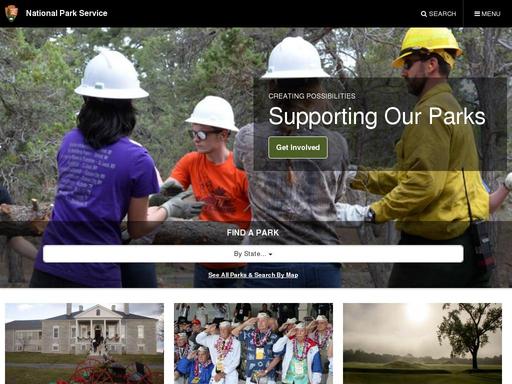Rate John Muir National Historic Site
Learn and Explore
Since 1916, the National Park Service has been entrusted with the care of our national parks. With the help of volunteers and partners, we safeguard these special places and share their stories with more than 275 million visitors every year. But our work doesn’t stop there.
We are proud that tribes, local governments, nonprofit organizations, businesses, and individual citizens ask for our help in revitalizing their communities, preserving local history, celebrating local heritage, and creating close to home opportunities for kids and families to get outside, be active, and have fun.
Taking care of the national parks and helping Americans take care of their communities is a job we love, and we need—and welcome—your help and support.
Our Mission
The National Park Service preserves unimpaired the natural and cultural resources and values of the National Park System for the enjoyment, education, and inspiration of this and future generations. The Park Service cooperates with partners to extend the benefits of natural and cultural resource conservation and outdoor recreation throughout this country and the world.
Frequently Asked Questions
How do I obtain a park entrance pass?
Only 118 of your 417 park sites charge entrance fees. You can obtain park entrance passes by visiting a park site that charges an entrance fee. Entrance fee sites have passes available; we recommend calling a park prior to your visit. (See the park search to locate a specific park.) There are a number of entrance passes available, including park-specific passes as well as passes that offer entrance to more than 2,000 federal recreation sites in addition to the national parks (Annual, Military, Senior, 4th Grade, Access, and Volunteer passes). Learn more about the America the Beautiful – The National Parks and Federal Recreational Lands Pass.
About this location:
National Historic Site
Operating Hours & Seasons
John Muir National Historic Site
The main park site and visitor center hours of operation.
Standard Hours
- Sunday:10:00 AM-5:00 PM
- Monday:10:00 AM-5:00 PM
- Tuesday:10:00 AM-5:00 PM
- Wednesday:10:00 AM-5:00 PM
- Thursday:10:00 AM-5:00 PM
- Friday:10:00 AM-5:00 PM
- Saturday:10:00 AM-5:00 PM
Fees & Passes
Entrance Fees:
- $0.00 – John Muir National Historic Site
The John Muir National Historic Site and Mount Wanda are free to visit.
Entrance Passes:
- $0.00 – John Muir National Historic Site
Passes are not require and are not sold at this location.
About
Fruit Rancher, Family Man, Writer…Father of the National Park Service!
John Muir played many roles in his life, all of which helped him succeed in his role as an advocate for Nature. As America’s most famous naturalist and conservationist, Muir fought to protect the wild places he loved, places we can still visit today. Muir’s writings convinced the U.S. government to protect Yosemite, Sequoia, Grand Canyon and Mt. Rainier as national parks.
Directions
Please visit our main website for specific directions to our park. You may call the John Muir Visitor Center for additional information.
Visitor Centers
John Muir National Historic Site Visitor Center
Main visitor center for the John Muir National Historic Site in Martinez, California.
Weather
The Mediterranean climate of Martinez features hot, dry summers with lower temperatures near 60º F and upper temperatures near 100º F. The heat gives way to cool, rainy winters with lows near 45º F and highs near 75º F. Fall and spring can bring rain and temperatures from 55-80º F. March to April: wet/dry, 60-80º F May to September: very dry, 60-100º+ F October to November: dry/wet, 55-80º F December to February: wet, 45-75º F







